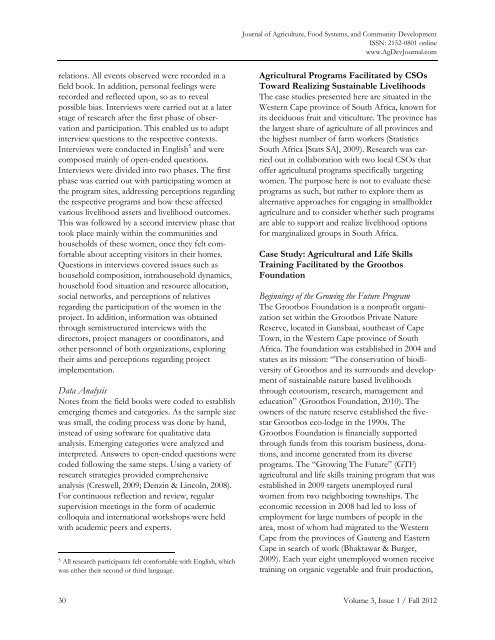Journal of Agriculture, Food Systems, and Community Development
Journal of Agriculture, Food Systems, and Community Development
Journal of Agriculture, Food Systems, and Community Development
You also want an ePaper? Increase the reach of your titles
YUMPU automatically turns print PDFs into web optimized ePapers that Google loves.
<strong>Journal</strong> <strong>of</strong> <strong>Agriculture</strong>, <strong>Food</strong> <strong>Systems</strong>, <strong>and</strong> <strong>Community</strong> <strong>Development</strong><br />
ISSN: 2152-0801 online<br />
www.AgDev<strong>Journal</strong>.com<br />
relations. All events observed were recorded in a<br />
field book. In addition, personal feelings were<br />
recorded <strong>and</strong> reflected upon, so as to reveal<br />
possible bias. Interviews were carried out at a later<br />
stage <strong>of</strong> research after the first phase <strong>of</strong> observation<br />
<strong>and</strong> participation. This enabled us to adapt<br />
interview questions to the respective contexts.<br />
Interviews were conducted in English 5 <strong>and</strong> were<br />
composed mainly <strong>of</strong> open-ended questions.<br />
Interviews were divided into two phases. The first<br />
phase was carried out with participating women at<br />
the program sites, addressing perceptions regarding<br />
the respective programs <strong>and</strong> how these affected<br />
various livelihood assets <strong>and</strong> livelihood outcomes.<br />
This was followed by a second interview phase that<br />
took place mainly within the communities <strong>and</strong><br />
households <strong>of</strong> these women, once they felt comfortable<br />
about accepting visitors in their homes.<br />
Questions in interviews covered issues such as<br />
household composition, intrahousehold dynamics,<br />
household food situation <strong>and</strong> resource allocation,<br />
social networks, <strong>and</strong> perceptions <strong>of</strong> relatives<br />
regarding the participation <strong>of</strong> the women in the<br />
project. In addition, information was obtained<br />
through semistructured interviews with the<br />
directors, project managers or coordinators, <strong>and</strong><br />
other personnel <strong>of</strong> both organizations, exploring<br />
their aims <strong>and</strong> perceptions regarding project<br />
implementation.<br />
Data Analysis<br />
Notes from the field books were coded to establish<br />
emerging themes <strong>and</strong> categories. As the sample size<br />
was small, the coding process was done by h<strong>and</strong>,<br />
instead <strong>of</strong> using s<strong>of</strong>tware for qualitative data<br />
analysis. Emerging categories were analyzed <strong>and</strong><br />
interpreted. Answers to open-ended questions were<br />
coded following the same steps. Using a variety <strong>of</strong><br />
research strategies provided comprehensive<br />
analysis (Creswell, 2009; Denzin & Lincoln, 2008).<br />
For continuous reflection <strong>and</strong> review, regular<br />
supervision meetings in the form <strong>of</strong> academic<br />
colloquia <strong>and</strong> international workshops were held<br />
with academic peers <strong>and</strong> experts.<br />
5 All research participants felt comfortable with English, which<br />
was either their second or third language.<br />
Agricultural Programs Facilitated by CSOs<br />
Toward Realizing Sustainable Livelihoods<br />
The case studies presented here are situated in the<br />
Western Cape province <strong>of</strong> South Africa, known for<br />
its deciduous fruit <strong>and</strong> viticulture. The province has<br />
the largest share <strong>of</strong> agriculture <strong>of</strong> all provinces <strong>and</strong><br />
the highest number <strong>of</strong> farm workers (Statistics<br />
South Africa [Stats SA], 2009). Research was carried<br />
out in collaboration with two local CSOs that<br />
<strong>of</strong>fer agricultural programs specifically targeting<br />
women. The purpose here is not to evaluate these<br />
programs as such, but rather to explore them as<br />
alternative approaches for engaging in smallholder<br />
agriculture <strong>and</strong> to consider whether such programs<br />
are able to support <strong>and</strong> realize livelihood options<br />
for marginalized groups in South Africa.<br />
Case Study: Agricultural <strong>and</strong> Life Skills<br />
Training Facilitated by the Grootbos<br />
Foundation<br />
Beginnings <strong>of</strong> the Growing the Future Program<br />
The Grootbos Foundation is a nonpr<strong>of</strong>it organization<br />
set within the Grootbos Private Nature<br />
Reserve, located in Gansbaai, southeast <strong>of</strong> Cape<br />
Town, in the Western Cape province <strong>of</strong> South<br />
Africa. The foundation was established in 2004 <strong>and</strong><br />
states as its mission: “The conservation <strong>of</strong> biodiversity<br />
<strong>of</strong> Grootbos <strong>and</strong> its surrounds <strong>and</strong> development<br />
<strong>of</strong> sustainable nature based livelihoods<br />
through ecotourism, research, management <strong>and</strong><br />
education” (Grootbos Foundation, 2010). The<br />
owners <strong>of</strong> the nature reserve established the fivestar<br />
Grootbos eco-lodge in the 1990s. The<br />
Grootbos Foundation is financially supported<br />
through funds from this tourism business, donations,<br />
<strong>and</strong> income generated from its diverse<br />
programs. The “Growing The Future” (GTF)<br />
agricultural <strong>and</strong> life skills training program that was<br />
established in 2009 targets unemployed rural<br />
women from two neighboring townships. The<br />
economic recession in 2008 had led to loss <strong>of</strong><br />
employment for large numbers <strong>of</strong> people in the<br />
area, most <strong>of</strong> whom had migrated to the Western<br />
Cape from the provinces <strong>of</strong> Gauteng <strong>and</strong> Eastern<br />
Cape in search <strong>of</strong> work (Bhaktawar & Burger,<br />
2009). Each year eight unemployed women receive<br />
training on organic vegetable <strong>and</strong> fruit production,<br />
30 Volume 3, Issue 1 / Fall 2012






